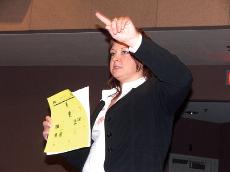The president and three vice presidents of the Student Government Association at the University of Louisville are generally referred to as the “top four.”
But proposed amendments to the organization’s constitution presented at last week’s student senate meeting could change that number to five.
Senators ultimately tabled the proposal for now, putting the idea of adding a programming vice president on hold.
SGA Executive Vice President Brian Hoffman, who presented the proposals to the senate in December of last year, said that an additional SGA vice president would alleviate pressure from growing duties of SGA officers.
“Some of the party planning needs to get out of the service vice president’s duties. They already have their hands full with housing, parking and many other important issues,” said Service Vice President Justin Tooley, a junior political science major.
But after short deliberation over the proposed amendments at the Jan. 16 senate meeting, Speed School Engineering Senator Allison Douglas, a senior industrial engineering major, moved that the issue be struck from the agenda.
Unless the issue is brought up at a future senate meeting, SGA’s constitution will not be ratified to include the PVP anytime in the near future.
But much debate over the creation of a PVP lingers between members of SGA and the Student Activities Board, the programming arm of SGA.
The main duties of the proposed PVP would include administering SGA programs and programming policies such as Welcome Weekend activities and the annual block party. The PVP would be elected by the student body and would also serve as the chairperson of SAB.
“SGA does so much work for the student body that it isn’t hard to believe that they would need another vice president in order to better serve students,” said sophomore art major Courtney Bray.
The idea of creating a PVP had been floating around SGA since last summer, said Hoffman, a junior political science major.
But members of SAB, who were present at last week’s senate meeting to express discontent with the proposals, said that they were not informed of a PVP until four days before the Jan. 16 senate meeting, the date on which the proposed amendments were to be voted on by the senate.
“[That’s] the thing that concerns me is that SAB was not consulted in the writing or planning of this new position and it directly affects SAB, “said Julia Onnembo, assistant director of SAB.
But Hoffman insisted that one of the motives behind the proposed amendments is to help unite SGA and SAB.
“We don’t want it to appear we are taking over SAB, but it seems this is the best way to bring both branches together. No one is there right now to defend SAB at SGA meetings,” Hoffman said.
“But I don’t know if a president over SAB would affect that dynamic,” Onnembo said. “SAB is about equality, it’s a diverse representative of the student body. It’s all about team work.”
Currently, SAB is divided into seven individual chairs with seven associate chairs beneath them. Each chair, which is individually appointed, holds the same amount of power in SAB decision making.
SAB receives its funding from SGA and is also housed in the same office in the Student Activities Center.
“While a president may help to better unite SGA and SAB, I also believe that if not handled carefully, the new position could cause more separation between the two organizations,” said junior bioengineering major Robert Buchberger.
SGA President Darrell Messer admitted, “We felt that SAB needed to be included more on the decision. SGA didn’t feel the issue was ready.” Messer is a senior majoring in computer engineering and computer science.
“The programming vice president was simply an idea that would bring more accountability to the SAB. I support the spirit of the PVP legislation but feel that there must be a more effective way to accomplish those goals,” said Arts and Sciences Senator Matt Flairty, a junior studying political science.
Since the issue was struck from the agenda at last week’s semate meeting, a new PVP will not be considered by student voters in the 2007 SGA elections this spring.






